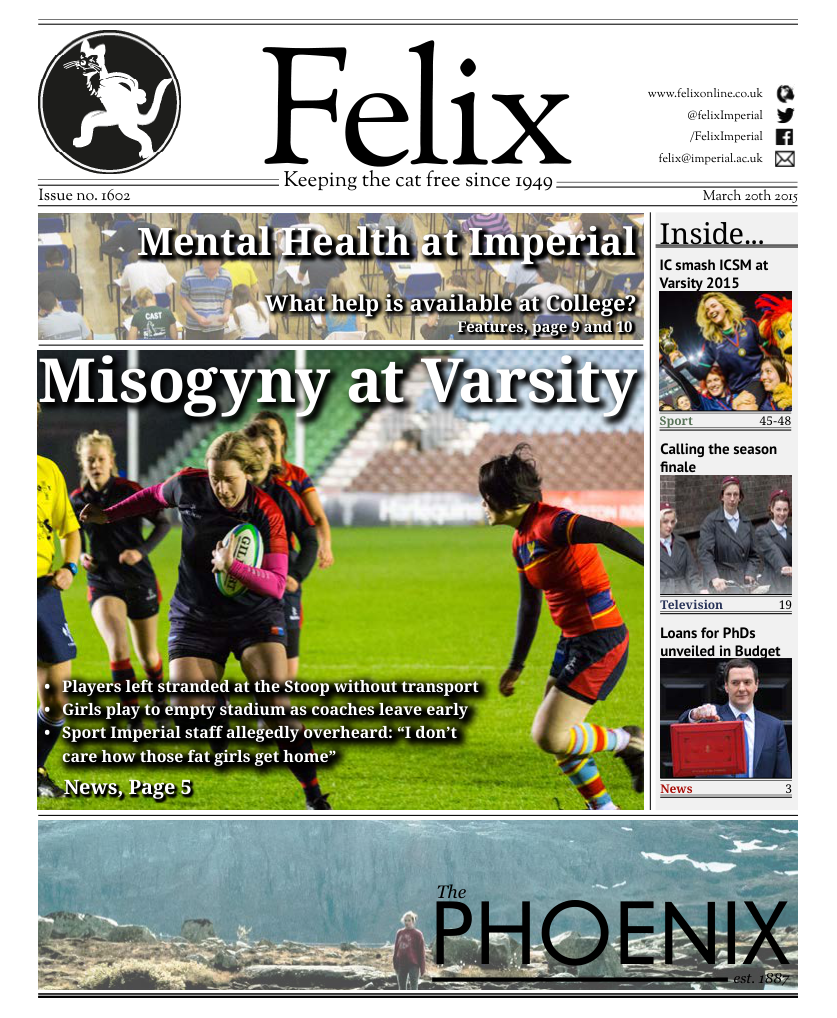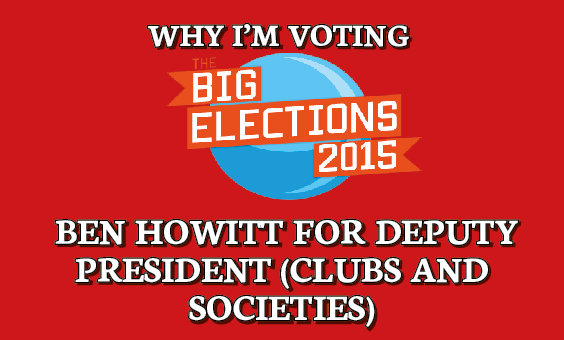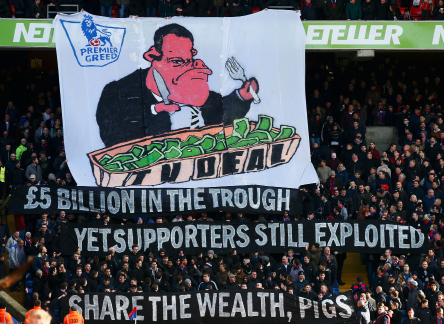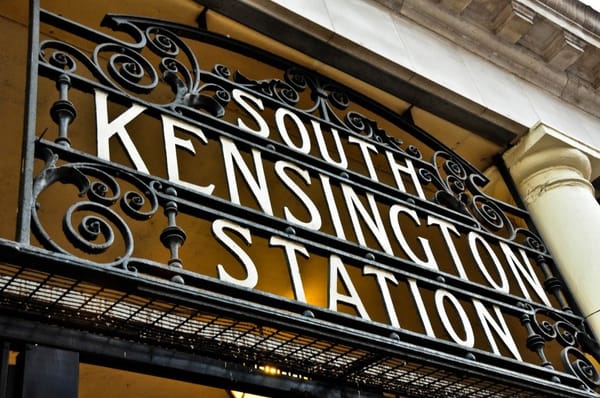Campaigning is hard work...
But is it all worth it in the end? Three people who've campaigned in the Big Elections share their views
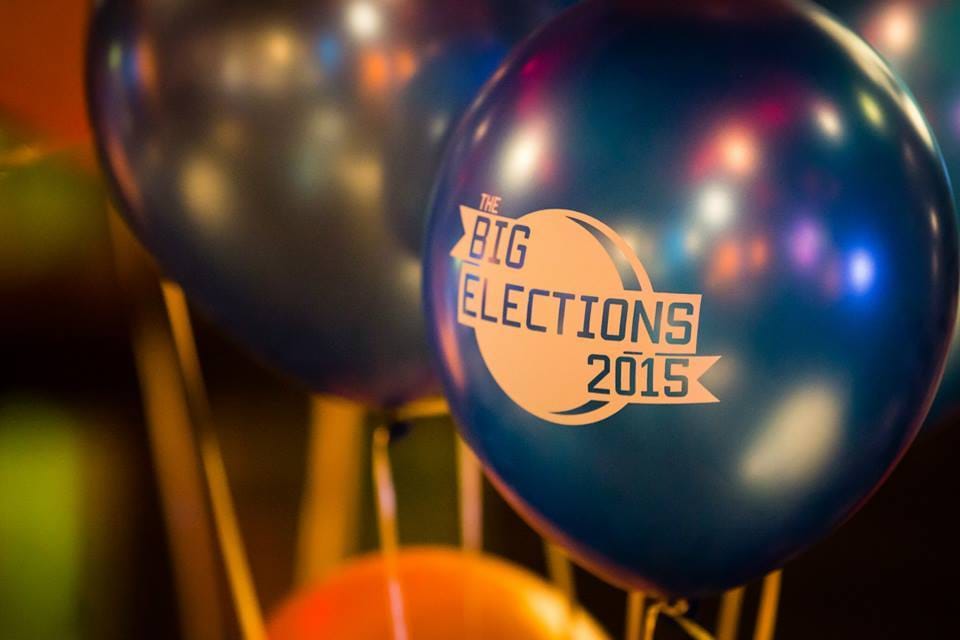
Tom Rivlin: Deputy President (Clubs and Societies) candidate, 2015
Let’s get one thing out of the way first: yes, I did just lose in the Big Elections. Yes, I am extremely bitter about this. Yes, you can read the whole article as just a sore loser whining about losing sorely if you want.
That said I do have some things to say about the whole ordeal.
The summary, really, is that I feel massively burned by this whole thing. I invested a lot of my self-worth, and a lot of time in this campaign, and losing has hit me on a deeply personal level. I’ve wanted to run for DPCS for a year now. I wrote my manifesto at Christmas. I started the poster and flyer designs a month in advance.
And then, when we were officially allowed to start campaigning, I spent almost every minute of almost every day out on campus talking to people, handing out flyers, putting up posters, doing lecture shout-outs to pretty much every year group in every department… all the stuff they tell you to do to win an election.
I caught a horrible flu bug on the first Thursday, but came in on Friday anyway to keep campaigning. To campaign properly and get the best shot at winning, one needs to put one’s degree and life on hold for two weeks, and you can still lose.
There’s no party politics here – every vote is up for grabs, every ‘seat’ is a swing seat. You probably have a couple of hundred assured votes from your mates and ‘factions’ such as societies – the other 3,500 votes (the rough number who made a vote for DPCS) are totally up for grabs.
Is it at all possible to convince enough of these people to vote for you to make it actually worth campaigning? A few years ago a candidate for Union President won over 2,000 votes and still lost.
How can we be expected to reach out to all those thousands of people, when everyone knows that the only sure-fire way to get a vote is to actually go out and talk to the person? Just making it rain flyers isn’t good enough. Just putting your face on a poster isn’t good enough.
I genuinely believe based on my experiences in this election, based on everything I’ve learned, that campaigning, in its entirety, is pointless. Ben and I were very similar candidates – similar levels of Union experience, similar manifesto points, very similar ideologies… How can there be a meaningful political discourse between two candidates with such little separating them?
I personally think that the number of voters whose opinions were swayed by any of our campaigning was far smaller than the number of people who ‘entered the booth’ either knowing they were going to vote for their mate, or not having interacted at all with any candidate. That latter group presumably had nothing but the pictures and manifestos to go on when making their choice.
So what’s the alternative? I’m not here to suggest one. The current system burned me badly. But maybe it really is the best of a lot of compromises.
Would I run for a sabbatical role again if I had the chance? Probably not; in my opinion it is not worth the time and effort those two weeks require to campaign, even if you do win.
Ben Howitt, Deputy President (Clubs and Societies) elect, 2015
I’m not going to come out spewing rainbows and say that campaigning was the most fun I’d had all year. It’s a stressful experience, and one that you need to prepare yourself for.
I was very lucky; I had a strong campaign team, and a number of people I could whine at when it all got a bit much. I also enjoyed the chats I had about my plans, and Union stuff that people actually care about. I learnt how a campaign works, and also some of what this year’s Sabb team are going to have to focus on.
The experience of campaigning is necessary to do the job. Sabbaticals shouldn’t necessarily be the most technically competent person – that’s what staff are for – but they should be the most relatable person to the student body.
Tom claims that convincing someone to vote for you is “totally pointless”. If you can’t convince people to get behind you though, how are you going to be the most relatable person to that same student body?
I have a huge amount of respect for how hard people campaigned, and the commitment of other candidates in this year’s elections intimidates me to some extent. But some of them missed the point.
What I think this election has made clear is that there needs to be a dialogue about candidates’ welfare during elections fortnight. With all the bright, colourful posters all over campus, it’s easy to forget the possible effects on the rest of your life.
The Returning Officer briefed us all on the first Monday of campaigning, and he made a point that the struggle with student elections is not to get people to vote for you, but to got them to vote at all. It’s also not until this meeting that you hear the words “more than half of you are going to lose,” and I think this doesn’t hit home with people until it is too late, and they have already committed to standing in the election.
I agree with Tom when he says that a large majority of voters weren’t involved in the election and didn’t interact with those campaigning. People log on, look at the pictures, maybe read a manifesto or two, and cast their vote. And immediately forget about it. However, even if the voters may not be the most invested in the campaigns, the candidates are; elections can take over their lives for two weeks and require considerable emotional commitment.
The Union has a ‘Campaigns Co-ordinator’ and four other staff members directly involved with HR, student development and general welfare. Why can’t some time be allowed to debrief some of the candidates in person, rather than an impersonal 1-5 scale of how you think it went, like the survey that candidates are asked to fill out after the elections are over?
I will say that you should definitely consider running for a Sabbatical in next year’s Big Elections. Not all elements of campaigning are for everyone, but you can make it work to your strengths; and if you do, it’s fun.
And if you don’t win, remember it’s not the end of all things. After all, there is definitely more to life than Imperial College Union.
Abi de Bruin, current Deputy President (Clubs and Societies)
This year seems to have seen an unfortunate turn to the negative with a lot of the campaigning that’s been going on – particularly it seems to have been less enjoyed by the candidates and it’s such a shame. I absolutely loved campaigning; it was two of the greatest weeks I’ve ever experienced. I loved talking about how much I loved the Union and wanted to be involved in it full time, spending two weeks talking about how amazing our clubs are and the incredible things they do was something I couldn’t get enough of.
Sure it was completely and utterly exhausting: I got ill, I got stressed, I lost a lot of my faith in my ability to actually do the job, but I also got to spend two weeks being completely encouraged by all the support from my friends and family. It’s an incredible position to be in to get to experience weeks of friends wandering round with your face on their shirt, and telling other people why you’re great. There’s very few other situations where you can get away with making your friends tell you you’re awesome for two weeks straight, and if you’re even a little narcissistic, you should totally run for a role just because of that.
Wandering round the JCR with bags of sweets; chatting to random strangers wherever I ran into them; and doing shout-outs in what I think was over thirty lectures was exhausting but so cool. Telling people what it was that the Union did, explaining why I wanted to get involved, what it is I would actually be doing, and then why they should vote for me to be the one doing that meant that I got to spend a lot of time being challenged on my motives and actually convincing people that I was the right person for it. Taking a random stranger from a ‘who is this crazy person talking to me, what is the Union, what are they talking about?’ to ‘oh maybe I’ll vote in these elections, and maybe I’ll vote for her’ was a really exciting experience.
Genuinely, the passion that people show off during election season is incredible to watch, and seeing the amount that some people really care about what goes on here is one of the greatest things about being involved in the Big elections.


